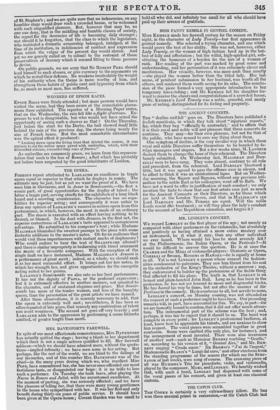THE OPERA.
FOREIGN report attributed to LABLACHE an excellence in tragic opera equal or superior to that which he displays in comic. The .estimate may be just, but as yet we want the proof of it. We have seen him in Geronimo, and in Assur in Semiramide,—the first a comic part, of good opportunities for the display of talent ; the latter a tragic part, serving chiefly for the exhibition of a long black beard and a scowling countenance. The character has no capa- bilities for superior acting; and consequently it were unfair to form any opinion of LABLACHE'S success in serious opera from this performance, in which, however, the most is made of an ordinary part. The music is executed with an effect leaving nothing to be desired, or blamed. In the duet with Arsaces, in the first act, the superior correctness of LABLACHE'S taste appeared to conspicuous advantage. He submitted to his composer's text ; while Madame MALIBRAN blemished the sweetest passage in the piece with some fantastic additions to the master's notes. Oh for an audience that would visit these impertinences with instant marks of displeasure ! Who could endure to hear the text of SHARSPEARE altered ? and there is similar impropriety in bedizening with tinsel ornament the music of a favourite composer. With the exception of the .single fault we have instanced, Madame MALIBRAN'S Arsaces is a performance of great merit ; indeed, as a whole, we should rank it as her most successful effort. It brings out her low notes, in which her strength lies, and gives opportunities for the energetic acting suited to her genius. LALANDE'S Semiramide we also rate as her best performance. It has not the dignity of PASTA, or the profound expression ; but it is extremely effective in another manner, not unsuited to the character, and of sustained elegance and grace. Her Semir- amide has more of the tender woman, and less of the haughty -queen, than the personation of the great artiste we have named. After these observations, it is scarcely necessary to add, that the opera is extremely well cast ; nevertheless, it has been so often repeated of late years, that scarcely any combination of talent can avert weariness. The second act goes off very heavily ; and LABLACHE adds to the oppression by performing a scena hitherto omitted, of greater length than merit.


























 Previous page
Previous page